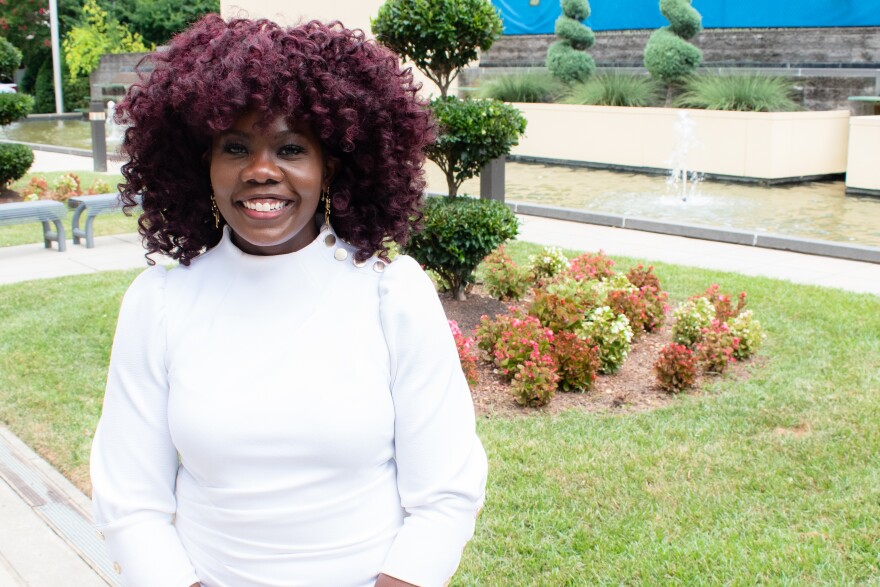The 2025 NAACP National Convention is being hosted in North Carolina, a state where many say the environmental justice movement originated.
Climate change was a hot topic on the floor of the Charlotte Convention Center.
Marginalized and low-income communities often stand to benefit the most from climate solutions — not just because they can save money on their monthly electricity bills — but because these communities also bear the most direct costs of fossil fuel pollution.
Lucas Sims came to the convention from Indiana State University, where he’s a graduate student. He’s also lived with asthma his whole life.
“When I saw that it was linked to climate change, I was like, ‘I should probably start doing my research on that,’” Sims said.
Combustion reactions, whether they happen during a catastrophic wildfire or during your morning commute, release fine particulates that can increase the risk of children developing asthma. In the United States, asthma rates are highest among Black and Puerto Rican populations.
Both smoke and pollen can trigger an asthma attack. A warmer climate has led to longer allergy seasons and higher pollen counts in much of the United States.

“Media kind of generalizes what climate change is, and kind of just bubbles it [away] to 'it just changes the weather,'” Sims said. “And that's not right ... it's way more than that.”
A recent Yale survey confirmed that many Americans see the connection between global warming and extreme heat, flooding and air pollution, but fewer understand the connection between our climate and things like the spread of disease.
Abre’ Conner, the NAACP's director of environmental and climate justice, hosted a panel on renewable energy solutions. She said that cutting carbon pollution at home — whether that’s through energy-saving retrofits, installing residential solar or even purchasing an electric vehicle — could help communities who are often on the frontlines of extreme weather:
“This is one of the ways that we ensure that our communities do not continue to experience as frequent and severe climate-related disasters,” Conner said.
SUPPORT LOCAL NEWS
No matter what happens in Congress, WFAE remains committed to our mission: to serve our community with fact-based, nonpartisan journalism. But our ability to do that depends on the strength of the financial response from the communities we serve. Please support our journalism by contributing today.
Starting downhill in an uphill fight against flooding
Many Black and brown communities settled in low-lying areas, in part because of segregation or discriminatory lending practices.
The Town of Princeville, North Carolina, and neighborhoods in New Orleans are good examples. This puts them on the climate vanguard, as global temperatures rise and flash floods become more common.
“The amount of water that's actually coming into the community in a short amount of time is increasing,” Conner said. “So, even if there are mechanisms that typically would allow for a community to drain the water, those mechanisms are not going to be sufficient for the climate-related disasters we're seeing now.”
Crystal German, executive vice president of the nonprofit lender Self Help, joined Conner on the panel.

At the same time that low-income communities are increasingly feeling the effects of climate change, Congress is phasing out tax credits for many of the renewable technologies that could help households curb their carbon emissions.
“Now the question is, what are we going to do now as these credits go away to make sure that households have access to the type of low-interest credit that they need to be able to afford these technologies?” German said.
German said her organization is working to ensure that people don’t fall back on predatory loans to make these investments.
“The communities that we work with have been aware of and fighting against the impact of environmental toxins,” German said. “They've been fighting for clean air and clean water and healthy environments for their children for decades.”
It’s a fight that started, in part, in Warren County, North Carolina. The convention’s Climate in Color Lounge depicts residents’ struggle to stop the dumping of carcinogenic polychlorinated biphenyls on local roadways. Many consider these protests to be the start of the environmental justice movement in the United States.
German and Conner also discussed how Black and brown communities could benefit from investing in renewable energy. Without federal tax breaks for renewables, low-income households will end up paying more for cleaner air and lower electricity bills — if they can afford to pay at all.
“It's not just the availability of the credits, right?” German said. “It's the impact of what green technologies mean on our environment, right? It's also the creation of quality jobs in these communities, right?”
When it comes to environmental pollution, folks ‘don’t complain enough’
The Southern Environmental Law Center set up a table at the NAACP convention to talk about environmental justice. The organization is perhaps best known for suing the government over environmental concerns. The SELC has sued the Trump administration for terminating multiple EPA grant programs that funded environmental and climate-related projects.
“It is no secret that communities of color and poor communities bear a disproportionate burden of environmental pollution,” said Jasmine Washington, a staff attorney with the SELC.
From what Washington heard at the convention, these conversations are happening between neighbors and family members, both in the home and in public spaces such as churches. These conversations often occur after state and federal regulators have already issued a permit. But Washington said there’s something folks can do to help identify environmental pollution earlier.
“They don’t complain enough. [Talk] to your neighbors about what you see in your backyard, literally,” Washington said.
The NAACP's 116th National Convention runs through Wednesday in Charlotte.



